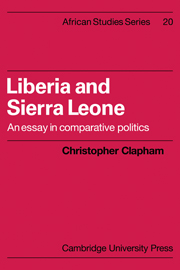Book contents
- Frontmatter
- Contents
- List of maps, tables and figures
- Preface
- Map A Liberia and Sierra Leone in West Africa
- 1 Political Comparison
- 2 Historical Summary
- 3 Resources
- 4 Rules
- 5 Political Allocation at the Centre
- 6 Centre and Periphery
- 7 Aspects of Political Economy
- 8 Concluding Review
- Statistical Appendix
- Bibliographical Note
- Notes
- Index
7 - Aspects of Political Economy
Published online by Cambridge University Press: 15 January 2010
- Frontmatter
- Contents
- List of maps, tables and figures
- Preface
- Map A Liberia and Sierra Leone in West Africa
- 1 Political Comparison
- 2 Historical Summary
- 3 Resources
- 4 Rules
- 5 Political Allocation at the Centre
- 6 Centre and Periphery
- 7 Aspects of Political Economy
- 8 Concluding Review
- Statistical Appendix
- Bibliographical Note
- Notes
- Index
Summary
POLITICAL AND ECONOMIC STRUCTURES
An economy is the purest form of political system. like other political systems, but in a particularly clear way, it provides a structure within which actors combine and compete with one another in pursuit of prizes. It incorporates a diverse collection of resources which may be useful in gaining these prizes, and a rule structure which sets the terms of exchange between the resources. It combines, too, the productive activities necessary for the maintenance of the society with the extractive, distributive and often coercive ones through which benefits are allocated, and through which those in advantaged positions generally seek to protect the rules which favour their own access to prizes. It is important to note that these rules consist not only in economic patterns of production and exchange, but equally in any kind of social, political or coercive pressure through which actors can extract a favourable share of the available allocations for themselves. The economy is thus not simply a source of influence on ‘the political system’: it is a political system, in which resources and relationships are combined, clarified and to some extent rendered measurable by their common concern with the prizes implicit in wealth.
Characteristically, actors have a common interest in the maintenance and growth of the economic processes through which wealth is created, but conflicting interests in the allocation of the wealth itself. Thus they seek to outmanoeuvre one another to improve their own allocations without upsetting the overall productive apparatus on which all rely.
- Type
- Chapter
- Information
- Liberia and Sierra LeoneAn Essay in Comparative Politics, pp. 100 - 119Publisher: Cambridge University PressPrint publication year: 1976

